Ward A.W. The Cambridge History of British Foreign Policy. 1783-1919. Volume 3
Подождите немного. Документ загружается.

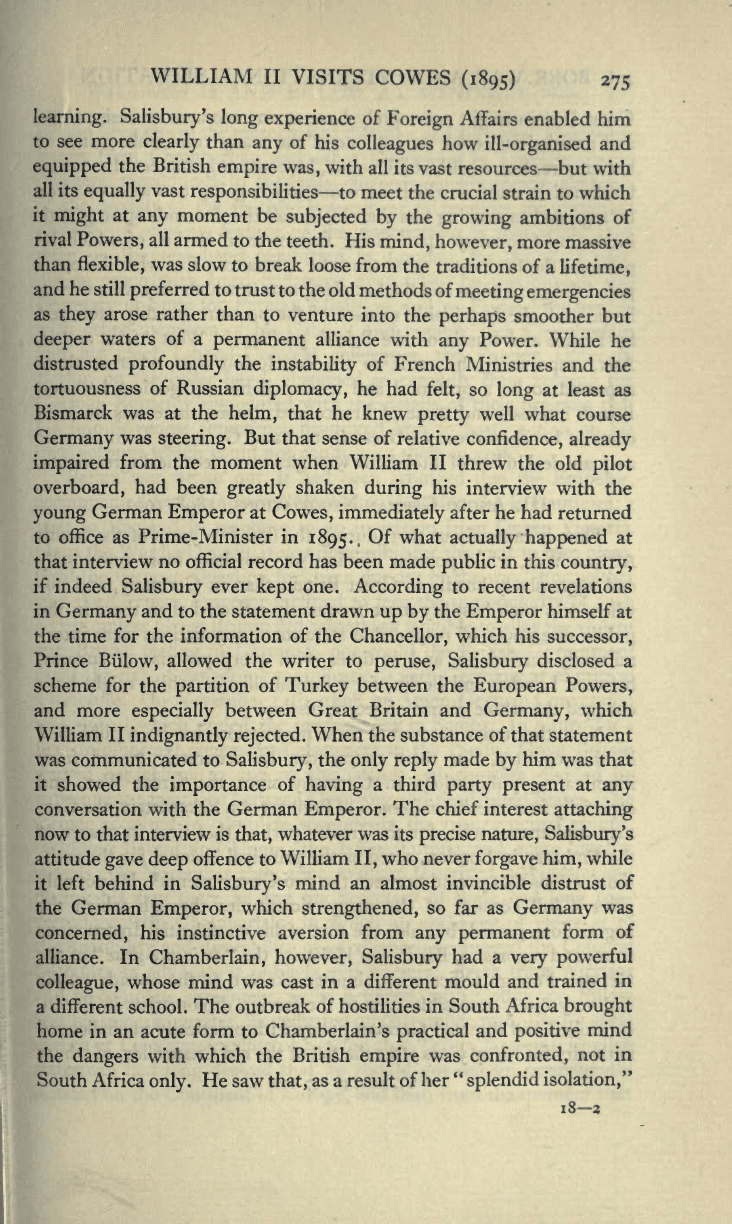
WILLIAM
II
VISITS
COWES
(1895)
275
learning.
Salisbury's
long
experience
of
Foreign
Affairs
enabled
him
to
see
more
clearly
than
any
of
his
colleagues
how
ill-organised
and
equipped
the
British
empire
was,
with
all
its vast resources
—
but
with
all
its
equally
vast
responsibilities
—
to
meet the crucial
strain to
which
it
might
at
any
moment
be
subjected
by
the
growing
ambitions
of
rival
Powers,
all
armed
to the
teeth. His
mind,
however,
more massive
than
flexible,
was
slow
to
break
loose from
the
traditions
of
a
lifetime,
and he
still
preferred
to
trust to the old
methods of
meeting
emergencies
as
they
arose
rather
than
to
venture
into the
perhaps
smoother but
deeper
waters
of
a
permanent
alliance
with
any
Power.
While he
distrusted
profoundly
the
instability
of
French
Ministries
and
the
tortuousness
of
Russian
diplomacy,
he had
felt,
so
long
at least
as
Bismarck
was
at the
helm,
that he knew
pretty
well
what course
Germany
was
steering.
But that sense
of
relative
confidence,
already
impaired
from
the
moment
when William II
threw the
old
pilot
overboard,
had
been
greatly
shaken
during
his
interview
with the
young
German
Emperor
at
Cowes,
immediately
after
he had
returned
to
office
as
Prime-Minister
in
1895.,
Of
what
actually happened
at
that interview
no
official
record has
been
made
public
in
this
country,
if
indeed
Salisbury
ever
kept
one.
According
to
recent
revelations
in
Germany
and
to the
statement
drawn
up by
the
Emperor
himself
at
the
time for
the information
of
the
Chancellor,
which his
successor,
Prince
Blilow,
allowed
the writer to
peruse, Salisbury
disclosed a
scheme
for
the
partition
of
Turkey
between
the
European
Powers,
and more
especially
between Great Britain
and
Germany,
which
William
II
indignantly rejected.
When
the substance
of
that statement
was
communicated to
Salisbury,
the
only
reply
made
by
him
was
that
it
showed
the
importance
of
having
a
third
party
present
at
any
conversation with
the German
Emperor.
The chief
interest
attaching
now
to
that
interview
is
that,
whatever
was
its
precise
nature,
Salisbury's
attitude
gave deep
offence
to
William
II,
who never
forgave
him,
while
it
left
behind in
Salisbury's
mind an
almost
invincible
distrust
of
the
German
Emperor,
which
strengthened,
so
far as
Germany
was
concerned,
his instinctive
aversion
from
any
permanent
form of
alliance.
In
Chamberlain,
however,
Salisbury
had a
very
powerful
colleague,
whose mind was cast
in
a
different
mould and trained
in
a
different
school. The
outbreak
of
hostilities
in
South
Africa
brought
home
in
an
acute
form
to
Chamberlain's
practical
and
positive
mind
the
dangers
with
which
the
British
empire
was
confronted,
not
in
South Africa
only.
He
saw
that,
as a
result
of
her
"
splendid
isolation,"
18-2
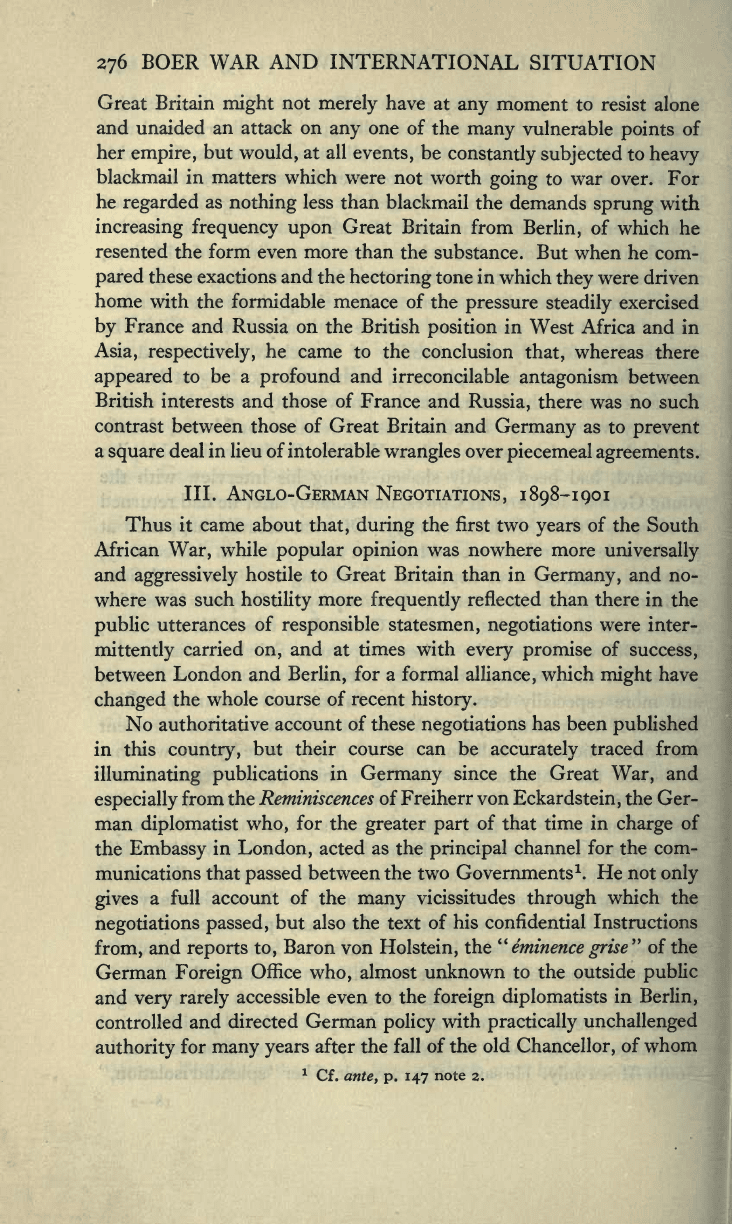
276
BOER WAR
AND
INTERNATIONAL
SITUATION
Great
Britain
might
not
merely
have
at
any
moment
to resist alone
and
unaided
an
attack
on
any
one of
the
many
vulnerable
points
of
her
empire,
but
would,
at
all
events,
be
constantly subjected
to
heavy
blackmail
in
matters
which
were
not worth
going
to
war
over.
For
he
regarded
as
nothing
less
than
blackmail
the
demands
sprung
with
increasing frequency upon
Great
Britain
from
Berlin,
of
which
he
resented the
form
even
more than
the
substance.
But when he com-
pared
these
exactions
and
the
hectoring
tone
in
which
they
were driven
home
with
the
formidable
menace
of
the
pressure
steadily
exercised
by
France and Russia on
the
British
position
in
West
Africa and in
Asia,
respectively,
he came
to the
conclusion
that,
whereas there
appeared
to be
a
profound
and
irreconcilable
antagonism
between
British
interests
and
those
of
France and
Russia,
there was no such
contrast between those
of
Great
Britain
and
Germany
as
to
prevent
a
square
deal
in
lieu
of
intolerable
wrangles
over
piecemeal
agreements.
III. Anglo-German
Negotiations,
i
898-1901
Thus
it
came
about
that,
during
the first
two
years
of
the
South
African
War,
while
popular opinion
was nowhere
more
universally
and
aggressively
hostile to Great
Britain
than
in
Germany,
and no-
where was
such
hostility
more
frequently
reflected than there in
the
public
utterances
of
responsible
statesmen,
negotiations
were inter-
mittently
carried
on,
and
at
times with
every
promise
of
success,
between
London and
Berlin,
for
a formal
alliance,
which
might
have
changed
the whole
course
of
recent
history.
No authoritative
account
of
these
negotiations
has been
published
in
this
country,
but their course
can be
accurately
traced
from
illuminating
publications
in
Germany
since the Great
War,
and
especially
from the
Reminiscences of Freiherr von
Eckardstein,
the Ger-
man
diplomatist
who,
for
the
greater
part
of
that time
in
charge
of
the
Embassy
in
London,
acted
as
the
principal
channel
for
the com-
munications
that
passed
between the two
Governments
1
. He
not
only
gives
a
full
account
of
the
many
vicissitudes
through
which
the
negotiations
passed,
but also the
text
of his
confidential Instructions
from,
and
reports
to,
Baron
von
Holstein,
the
"
eminence
grise
"
of
the
German
Foreign
Office
who,
almost
unknown
to the
outside
public
and
very
rarely
accessible
even to the
foreign diplomatists
in
Berlin,
controlled
and
directed
German
policy
with
practically
unchallenged
authority
for
many years
after the
fall
of
the
old
Chancellor,
of
whom
1
Cf.
ante,
p.
147
note
2.
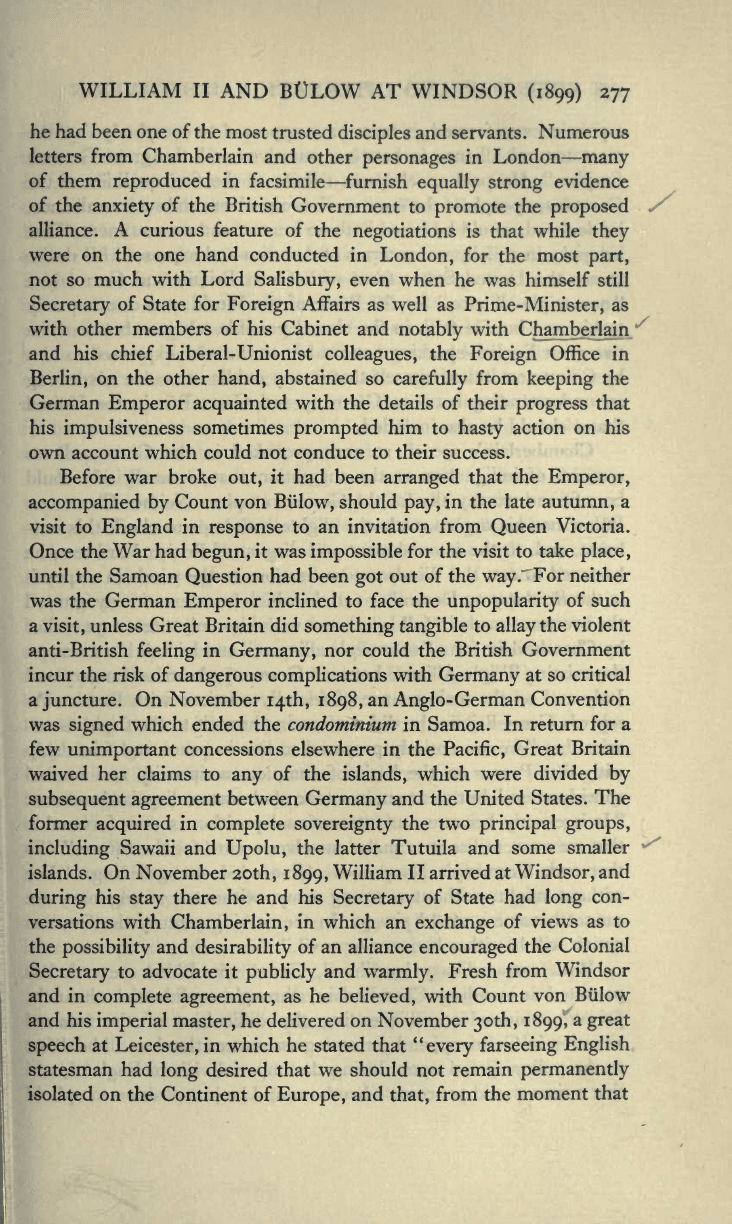
WILLIAM II
AND
BOLOW AT
WINDSOR
(1899)
277
he
had
been one of
the
most
trusted
disciples
and
servants.
Numerous
letters
from
Chamberlain and
other
personages
in
London
—
many
of them
reproduced
in
facsimile
—
furnish
equally
strong
evidence
of the
anxiety
of
the British
Government
to
promote
the
proposed
alliance.
A
curious
feature of
the
negotiations
is
that
while
they
were on the one
hand
conducted
in
London,
for
the
most
part,
not so
much
with
Lord
Salisbury,
even
when he was himself still
Secretary
of
State
for
Foreign
Affairs as well
as
Prime-Minister,
as
with
other members of his
Cabinet
and
notably
with Chamberlain
y
and his chief
Liberal-Unionist
colleagues,
the
Foreign
Office in
Berlin,
on the
other
hand,
abstained
so
carefully
from
keeping
the
German
Emperor
acquainted
with the details
of
their
progress
that
his
impulsiveness
sometimes
prompted
him
to
hasty
action
on his
own
account
which could
not
conduce to their success.
Before war broke
out,
it
had
been
arranged
that the
Emperor,
accompanied
by
Count
von
Biilow,
should
pay,
in
the late
autumn,
a
visit to
England
in
response
to
an
invitation
from
Queen
Victoria.
Once
the
War had
begun,
it
was
impossible
for
the
visit to take
place,
until the
Samoan
Question
had been
got
out
of
the
way.'
For
neither
was
the German
Emperor
inclined
to face the
unpopularity
of such
a
visit,
unless Great Britain
did
something
tangible
to
allay
the violent
anti-British
feeling
in
Germany,
nor could
the British
Government
incur
the
risk of
dangerous
complications
with
Germany
at
so critical
a
juncture.
On November
14th,
1898,
an
Anglo-German
Convention
was
signed
which ended
the
condominium
in Samoa.
In
return
for a
few
unimportant
concessions elsewhere in
the
Pacific,
Great
Britain
waived
her
claims
to
any
of
the
islands,
which
were
divided
by
subsequent agreement
between
Germany
and the United
States.
The
former
acquired
in
complete
sovereignty
the two
principal
groups,
including
Sawaii
and
Upolu,
the latter
Tutuila and
some
smaller
islands. On November
20th,
1
899,
William II arrived at
Windsor,
and
during
his
stay
there
he
and
his
Secretary
of
State
had
long
con-
versations with
Chamberlain,
in which
an
exchange
of views
as to
the
possibility
and
desirability
of an
alliance
encouraged
the
Colonial
Secretary
to
advocate it
publicly
and
warmly.
Fresh
from
Windsor
and in
complete
agreement,
as
he
believed,
with
Count
von
Biilow
and
his
imperial
master,
he delivered
on
November
30th,
1899,
a
great
speech
at
Leicester,
in which
he
stated
that
"every
farseeing
English
statesman
had
long
desired that
we should
not
remain
permanently
isolated
on
the
Continent
of
Europe,
and
that,
from the
moment
that
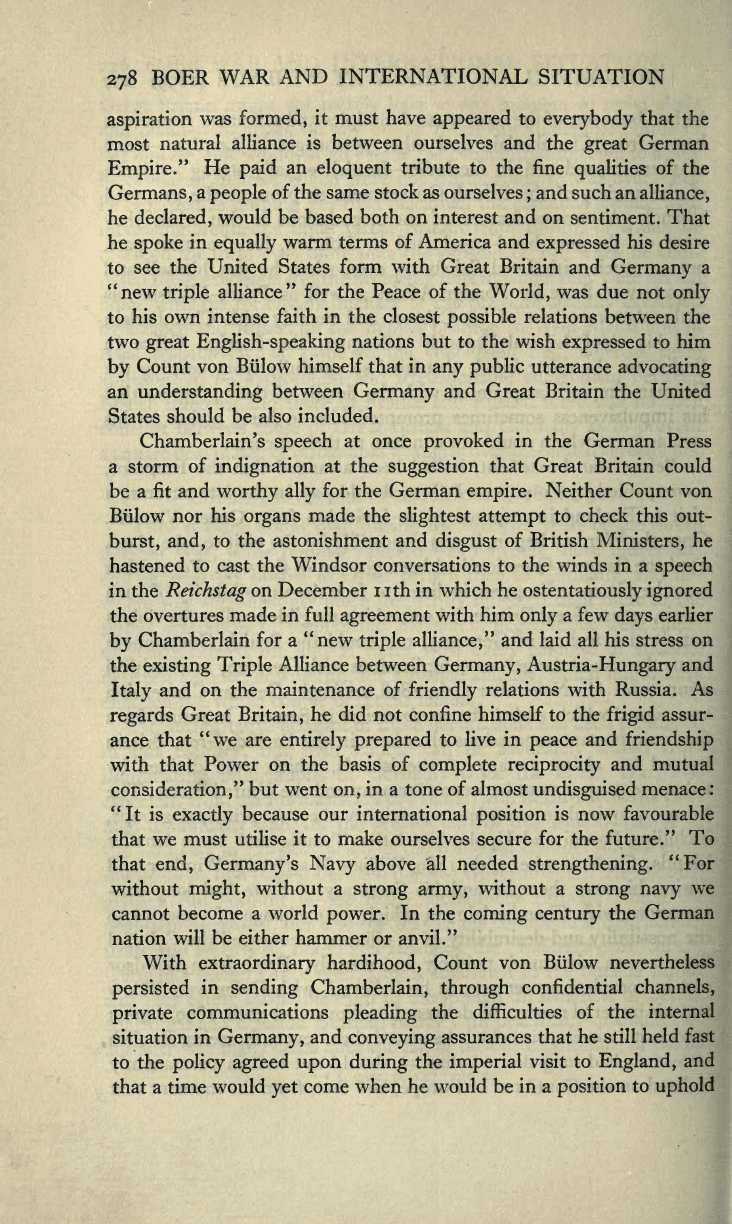
278
BOER
WAR
AND INTERNATIONAL
SITUATION
aspiration
was
formed,
it
must have
appeared
to
everybody
that the
most
natural
alliance is between
ourselves
and
the
great
German
Empire."
He
paid
an
eloquent
tribute to the
fine
qualities
of
the
Germans,
a
people
of the same stock as ourselves
;
and such an
alliance,
he
declared,
would
be based both on
interest
and
on
sentiment.
That
he
spoke
in
equally
warm
terms
of
America and
expressed
his
desire
to
see the United States
form
with
Great Britain and
Germany
a
"new
triple
alliance"
for the Peace
of
the
World,
was due
not
only
to
his own
intense
faith
in
the closest
possible
relations
between the
two
great
English-speaking
nations but to the
wish
expressed
to
him
by
Count
von
Biilow himself
that
in
any
public
utterance
advocating
an
understanding
between
Germany
and
Great
Britain
the
United
States
should be
also included.
Chamberlain's
speech
at once
provoked
in
the German Press
a
storm
of
indignation
at the
suggestion
that
Great Britain
could
be
a fit
and
worthy ally
for
the German
empire.
Neither Count von
Biilow
nor
his
organs
made
the
slightest attempt
to check this out-
burst,
and,
to
the
astonishment
and
disgust
of
British
Ministers,
he
hastened
to cast the
Windsor
conversations to the winds
in
a
speech
in the
Reichstag
on
December
i
ith
in which he
ostentatiously ignored
the
overtures
made
in
full
agreement
with
him
only
a
few
days
earlier
by
Chamberlain
for
a
"new
triple
alliance,"
and laid all his
stress
on
the
existing
Triple
Alliance
between
Germany, Austria-Hungary
and
Italy
and on the maintenance
of
friendly
relations with
Russia.
As
regards
Great
Britain,
he did
not confine
himself
to the
frigid
assur-
ance that
"we
are
entirely prepared
to
live in
peace
and
friendship
with that
Power
on the basis of
complete
reciprocity
and
mutual
consideration,"
but went
on,
in
a tone
of
almost
undisguised
menace
:
"It
is
exactly
because our
international
position
is now favourable
that
we must utilise
it
to make ourselves secure
for
the future."
To
that
end,
Germany's Navy
above
all needed
strengthening.
"For
without
might,
without
a
strong
army,
without a
strong navy
we
cannot
become
a world
power.
In
the
coming
century
the
German
nation
will
be
either hammer or
anvil."
With
extraordinary
hardihood,
Count
von
Biilow
nevertheless
persisted
in
sending
Chamberlain,
through
confidential
channels,
private
communications
pleading
the difficulties
of
the
internal
situation
in
Germany,
and
conveying
assurances that
he still
held
fast
to the
policy
agreed
upon
during
the
imperial
visit to
England,
and
that
a time
would
yet
come when he
would be
in a
position
to
uphold
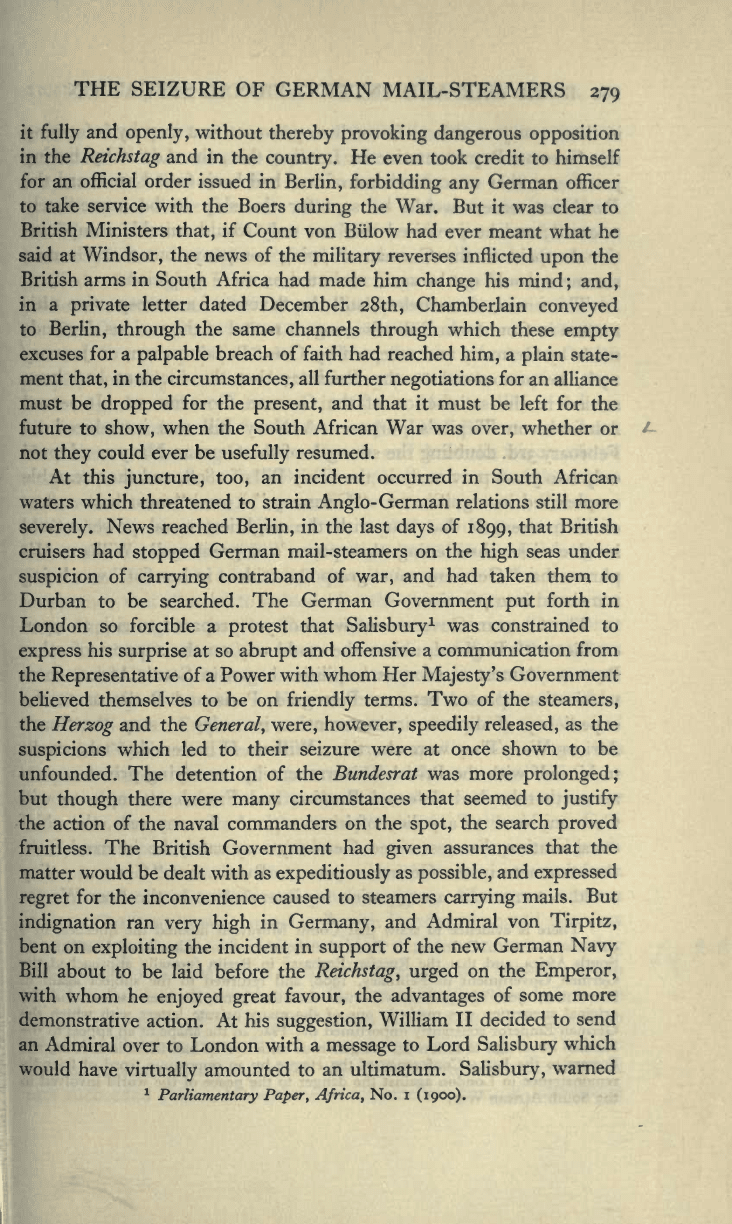
THE
SEIZURE
OF
GERMAN
MAIL-STEAMERS
279
it
fully
and
openly,
without
thereby
provoking dangerous
opposition
in
the
Reichstag
and in
the
country.
He even took credit
to
himself
for
an official order
issued in
Berlin,
forbidding
any
German officer
to take
service with
the Boers
during
the
War. But
it was
clear
to
British
Ministers
that,
if
Count
von Biilow
had
ever
meant what
he
said at
Windsor,
the news of
the
military
reverses
inflicted
upon
the
British arms
in
South Africa had
made him
change
his
mind;
and,
in
a
private
letter dated
December
28th,
Chamberlain
conveyed
to
Berlin,
through
the same channels
through
which
these
empty
excuses for a
palpable
breach of
faith
had
reached
him,
a
plain
state-
ment
that,
in
the
circumstances,
all
further
negotiations
for an
alliance
must be
dropped
for
the
present,
and
that
it
must be
left
for
the
future
to
show,
when
the South
African War was
over,
whether or
not
they
could ever
be
usefully
resumed.
At this
juncture,
too,
an
incident
occurred in
South
African
waters which
threatened to strain
Anglo-German
relations still more
severely.
News
reached
Berlin,
in
the last
days
of
1899,
that
British
cruisers had
stopped
German mail-steamers
on the
high
seas under
suspicion
of
carrying
contraband
of
war,
and had
taken them
to
Durban
to be searched. The
German Government
put
forth in
London
so
forcible
a
protest
that
Salisbury
1
was
constrained to
express
his
surprise
at so
abrupt
and offensive
a
communication
from
the
Representative
of a Power
with
whom Her
Majesty's
Government
believed
themselves to
be on
friendly
terms.
Two of
the
steamers,
the
Herzog
and the
General, were,
however,
speedily
released,
as
the
suspicions
which
led
to
their seizure
were at
once shown to be
unfounded. The
detention
of
the Bundesrat
was more
prolonged;
but
though
there were
many
circumstances that
seemed to
justify
the
action of
the
naval commanders
on
the
spot,
the
search
proved
fruitless.
The
British
Government
had
given
assurances
that
the
matter would be
dealt
with
as
expeditiously
as
possible,
and
expressed
regret
for
the inconvenience
caused to steamers
carrying
mails.
But
indignation
ran
very high
in
Germany,
and
Admiral von
Tirpitz,
bent
on
exploiting
the
incident
in
support
of the
new German
Navy
Bill
about to be laid before
the
Reichstag,
urged
on the
Emperor,
with
whom
he
enjoyed great
favour,
the
advantages
of
some
more
demonstrative
action.
At
his
suggestion,
William
II
decided
to
send
an
Admiral
over to London
with a
message
to
Lord
Salisbury
which
would
have
virtually
amounted
to
an ultimatum.
Salisbury,
warned
1
Parliamentary Paper,
Africa,
No.
i
(1900).
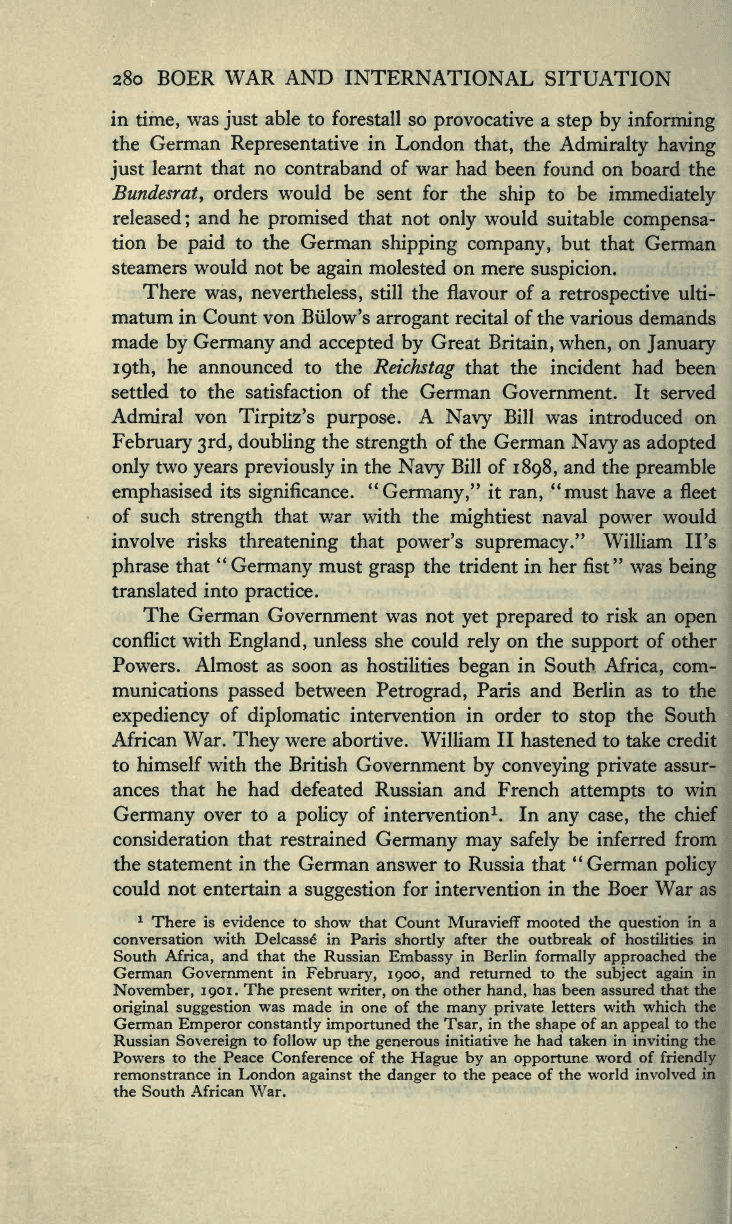
280 BOER
WAR
AND
INTERNATIONAL
SITUATION
in
time,
was
just
able to
forestall so
provocative
a
step
by
informing
the German
Representative
in
London
that,
the
Admiralty
having
just
learnt that
no
contraband
of war
had
been found on board the
Bundesrat,
orders would
be
sent
for
the
ship
to
be
immediately
released;
and he
promised
that
not
only
would
suitable
compensa-
tion
be
paid
to the German
shipping
company,
but
that German
steamers
would
not
be
again
molested
on
mere
suspicion.
There
was,
nevertheless,
still the flavour of
a
retrospective
ulti-
matum
in
Count
von
Billow's
arrogant
recital
of
the various demands
made
by Germany
and
accepted
by
Great
Britain,
when,
on
January
19th,
he announced to
the
Reichstag
that the
incident
had
been
settled to the
satisfaction
of
the
German
Government. It served
Admiral von
Tirpitz's
purpose.
A
Navy
Bill
was
introduced
on
February 3rd, doubling
the
strength
of
the German
Navy
as
adopted
only
two
years previously
in
the
Navy
Bill of
1898,
and
the
preamble
emphasised
its
significance.
"
Germany/'
it
ran,
"must have
a
fleet
of such
strength
that
war
with the
mightiest
naval
power
would
involve risks
threatening
that
power's
supremacy."
William IPs
phrase
that
"
Germany
must
grasp
the trident
in her
fist" was
being
translated
into
practice.
The German
Government was
not
yet
prepared
to
risk
an
open
conflict with
England,
unless
she
could
rely
on
the
support
of other
Powers. Almost
as soon as
hostilities
began
in
South
Africa,
com-
munications
passed
between
Petrograd,
Paris and
Berlin
as
to the
expediency
of
diplomatic
intervention
in order
to
stop
the
South
African War.
They
were abortive. William
II
hastened to take credit
to himself with the
British
Government
by conveying
private
assur-
ances that he
had
defeated Russian and French
attempts
to
win
Germany
over to a
policy
of
intervention
1
.
In
any
case,
the chief
consideration
that
restrained
Germany may safely
be inferred
from
the statement
in
the German
answer to
Russia
that
"German
policy
could
not
entertain
a
suggestion
for
intervention
in
the
Boer
War as
1
There is
evidence
to
show
that Count Muravieff
mooted the
question
in a
conversation
with Delcass£
in
Paris
shortly
after the outbreak of
hostilities
in
South
Africa,
and
that the
Russian
Embassy
in
Berlin
formally approached
the
German
Government
in
February, 1900,
and returned to the
subject again
in
November, 1901.
The
present writer,
on the
other
hand,
has been assured that
the
original
suggestion
was
made
in one
of the
many
private
letters with
which the
German
Emperor
constantly importuned
the
Tsar,
in
the
shape
of an
appeal
to
the
Russian
Sovereign
to
follow
up
the
generous
initiative
he had taken in
inviting
the
Powers to the
Peace
Conference
of
the
Hague
by
an
opportune
word of
friendly
remonstrance
in London
against
the
danger
to
the
peace
of the
world involved
in
the South
African
War.
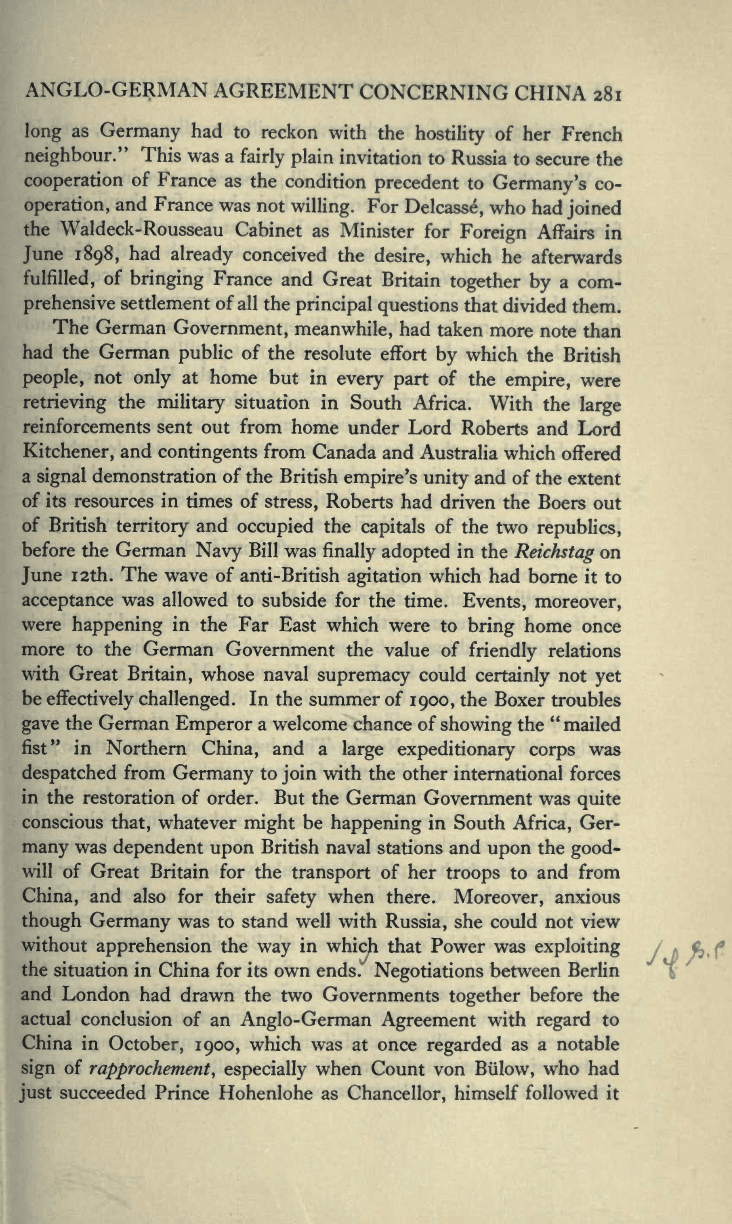
ANGLO-GERMAN
AGREEMENT
CONCERNING
CHINA
281
long
as
Germany
had
to
reckon
with
the
hostility
of
her
French
neighbour."
This
was
a
fairly
plain
invitation
to Russia
to secure
the
cooperation
of
France
as
the
condition
precedent
to
Germany's
co-
operation,
and
France
was
not
willing.
For
Delcasse\
who
had
joined
the
Waldeck-
Rousseau
Cabinet as
Minister for
Foreign
Affairs
in
June
1898,
had
already
conceived
the
desire,
which
he
afterwards
fulfilled,
of
bringing
France and
Great
Britain
together
by
a
com-
prehensive
settlement
of
all
the
principal
questions
that divided
them.
The German
Government,
meanwhile,
had
taken
more
note than
had
the German
public
of
the
resolute
effort
by
which
the
British
people,
not
only
at
home
but
in
every
part
of
the
empire,
were
retrieving
the
military
situation in
South
Africa.
With
the
large
reinforcements
sent out
from
home
under Lord
Roberts and
Lord
Kitchener,
and
contingents
from
Canada
and
Australia
which
offered
a
signal
demonstration
of
the British
empire's
unity
and
of
the
extent
of
its resources
in
times of
stress,
Roberts had
driven
the
Boers
out
of
British
territory
and
occupied
the
capitals
of the
two
republics,
before
the German
Navy
Bill was
finally
adopted
in
the
Reichstag
on
June
1
2th.
The wave of
anti-British
agitation
which had
borne
it to
acceptance
was
allowed
to
subside
for
the
time.
Events,
moreover,
were
happening
in
the Far
East which
were
to
bring
home once
more to the
German
Government the
value
of
friendly
relations
with
Great
Britain,
whose
naval
supremacy
could
certainly
not
yet
be
effectively
challenged.
In
the
summer
of
1900,
the
Boxer troubles
gave
the German
Emperor
a
welcome
chance
of
showing
the
"mailed
fist"
in
Northern
China,
and a
large
expeditionary
corps
was
despatched
from
Germany
to
join
with the other
international
forces
in
the
restoration
of
order.
But the
German
Government was
quite
conscious
that,
whatever
might
be
happening
in
South
Africa,
Ger-
many
was
dependent
upon
British
naval
stations and
upon
the
good-
will
of
Great
Britain for the
transport
of her
troops
to
and from
China,
and
also for
their
safety
when
there.
Moreover,
anxious
though
Germany
was
to
stand well with
Russia,
she could not
view
without
apprehension
the
way
in
which
that
Power was
exploiting
the
situation in
China for
its
own ends.
Negotiations
between
Berlin
and
London
had
drawn
the two
Governments
together
before the
actual
conclusion
of
an
Anglo-German Agreement
with
regard
to
China
in
October,
1900,
which was
at once
regarded
as
a notable
sign
of
rapprochement,
especially
when
Count
von
Biilow,
who had
just
succeeded
Prince Hohenlohe as
Chancellor,
himself
followed
it
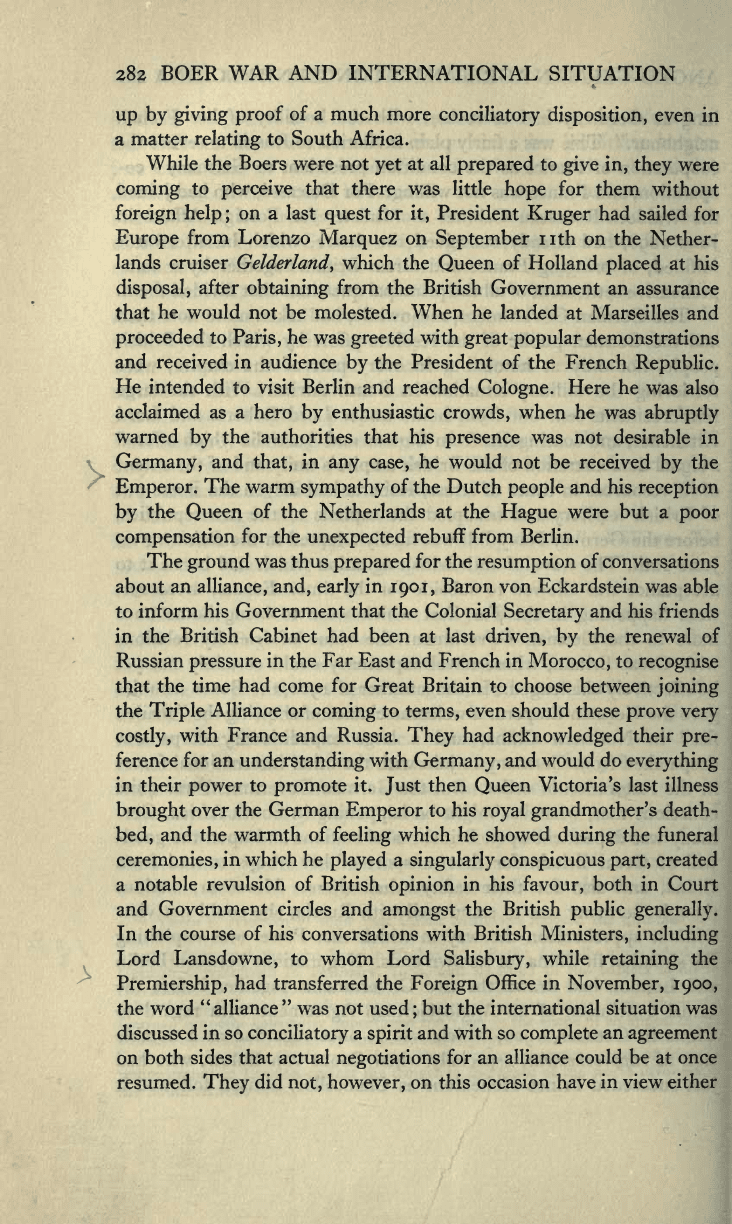
>
282 BOER
WAR
AND
INTERNATIONAL
SITUATION
up by giving
proof
of a
much
more
conciliatory
disposition,
even
in
a matter
relating
to South Africa.
While the Boers were
not
yet
at
all
prepared
to
give
in,
they
were
coming
to
perceive
that there
was little
hope
for
them
without
foreign help;
on
a last
quest
for
it,
President
Kruger
had
sailed for
Europe
from Lorenzo
Marquez
on
September
nth on the Nether-
lands cruiser
Gelderland,
which the
Queen
of
Holland
placed
at
his
disposal,
after
obtaining
from
the
British Government an
assurance
that
he
would
not
be
molested. When he
landed at
Marseilles and
proceeded
to
Paris,
he
was
greeted
with
great popular
demonstrations
and received
in
audience
by
the
President
of
the French
Republic.
He
intended to visit Berlin and reached
Cologne.
Here he
was also
acclaimed as a hero
by
enthusiastic
crowds,
when he was
abruptly
warned
by
the authorities that his
presence
was not desirable in
Germany,
and
that,
in
any
case,
he
would
not
be received
by
the
Emperor.
The warm
sympathy
of
the Dutch
people
and his
reception
by
the
Queen
of
the
Netherlands
at the
Hague
were
but
a
poor
compensation
for
the
unexpected
rebuff
from
Berlin.
The
ground
was thus
prepared
for
the
resumption
of
conversations
about
an
alliance, and,
early
in
1901,
Baron von Eckardstein was
able
to
inform
his
Government that the Colonial
Secretary
and his
friends
in the British Cabinet
had been
at last
driven,
by
the renewal
of
Russian
pressure
in
the
Far
East
and French
in
Morocco,
to
recognise
that
the time
had
come
for
Great
Britain
to
choose
between
joining
the
Triple
Alliance
or
coming
to
terms,
even
should
these
prove
very
costly,
with
France
and
Russia.
They
had
acknowledged
their
pre-
ference
for an
understanding
with
Germany,
and
would
do
everything
in
their
power
to
promote
it.
Just
then
Queen
Victoria's last illness
brought
over
the
German
Emperor
to
his
royal
grandmother's
death-
bed,
and the warmth
of
feeling
which he showed
during
the funeral
ceremonies,
in which
he
played
a
singularly
conspicuous part,
created
a notable
revulsion of
British
opinion
in his
favour,
both
in
Court
and
Government
circles
and
amongst
the British
public
generally.
In
the
course
of his
conversations with
British
Ministers,
including
Lord
Lansdowne,
to whom Lord
Salisbury,
while
retaining
the
Premiership,
had
transferred the
Foreign
Office
in
November,
1900,
the
word
"alliance
"
was
not used
;
but
the
international
situation
was
discussed
in so
conciliatory
a
spirit
and
with
so
complete
an
agreement
on both sides that actual
negotiations
for
an alliance
could
be
at
once
resumed.
They
did
not, however,
on
this
occasion
have
in view
either
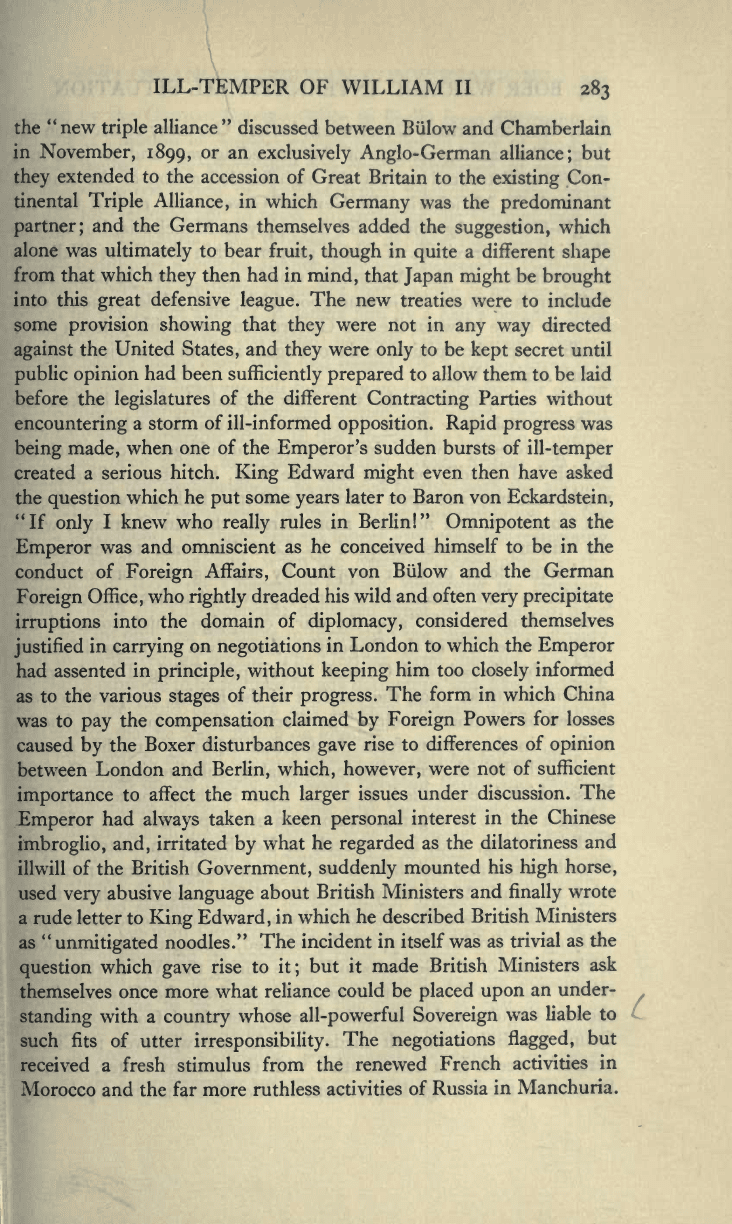
ILL-TEMPER OF
WILLIAM II
283
the
"new
triple
alliance
"
discussed
between Biilow and
Chamberlain
in
November,
1899,
or
an
exclusively Anglo-German
alliance;
but
they
extended
to the
accession of
Great Britain
to the
existing
Con-
tinental
Triple
Alliance,
in
which
Germany
was
the
predominant
partner;
and
the
Germans
themselves
added
the
suggestion,
which
alone
was
ultimately
to bear
fruit,
though
in
quite
a
different
shape
from
that
which
they
then had
in
mind,
that
Japan
might
be
brought
into
this
great
defensive
league.
The
new
treaties were
to
include
some
provision showing
that
they
were not in
any way
directed
against
the
United
States,
and
they
were
only
to
be
kept
secret until
public opinion
had
been
sufficiently
prepared
to allow
them to be laid
before
the
legislatures
of
the different
Contracting
Parties
without
encountering
a storm
of
ill-informed
opposition.
Rapid
progress
was
being
made,
when
one of
the
Emperor's
sudden bursts
of
ill-temper
created
a
serious hitch.
King
Edward
might
even
then
have asked
the
question
which he
put
some
years
later to
Baron von
Eckardstein,
"If
only
I
knew who
really
rules
in Berlin!"
Omnipotent
as
the
Emperor
was
and
omniscient
as he conceived
himself
to
be
in
the
conduct
of
Foreign
Affairs,
Count
von Biilow and
the
German
Foreign
Office,
who
rightly
dreaded his
wild
and
often
very
precipitate
irruptions
into the
domain of
diplomacy,
considered themselves
justified
in
carrying
on
negotiations
in
London
to
which
the
Emperor
had assented
in
principle,
without
keeping
him
too
closely
informed
as to the
various
stages
of
their
progress.
The form
in which China
was to
pay
the
compensation
claimed
by
Foreign
Powers for
losses
caused
by
the
Boxer disturbances
gave
rise
to
differences
of
opinion
between
London and
Berlin,
which,
however,
were
not
of sufficient
importance
to affect the
much
larger
issues
under
discussion.
The
Emperor
had
always
taken
a keen
personal
interest
in
the
Chinese
imbroglio,
and,
irritated
by
what
he
regarded
as the
dilatoriness
and
ill
will of
the British
Government,
suddenly
mounted his
high
horse,
used
very
abusive
language
about
British Ministers
and
finally
wrote
a rude
letter to
King
Edward,
in which
he described
British
Ministers
as
"unmitigated
noodles."
The incident
in
itself
was
as
trivial
as the
question
which
gave
rise
to
it;
but it
made British
Ministers
ask
themselves once more what
reliance
could be
placed
upon
an
under-
standing
with
a
country
whose
all-powerful
Sovereign
was
liable to
such
fits
of
utter
irresponsibility.
The
negotiations
flagged,
but
received a
fresh stimulus
from the
renewed
French
activities
in
Morocco and the far
more
ruthless
activities
of
Russia
in
Manchuria.
C
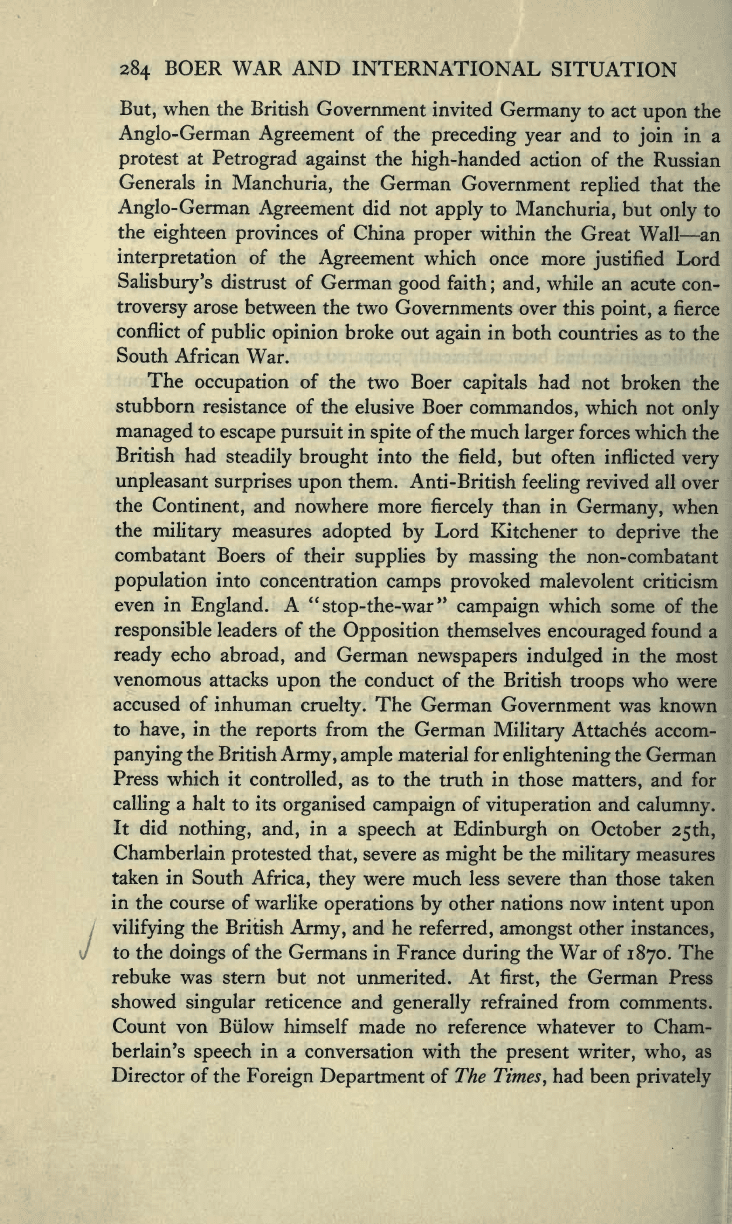
J
284
BOER WAR AND
INTERNATIONAL
SITUATION
But,
when the British
Government invited
Germany
to
act
upon
the
Anglo-German
Agreement
of
the
preceding year
and
to
join
in
a
protest
at
Petrograd
against
the
high-handed
action
of
the Russian
Generals
in
Manchuria,
the
German
Government
replied
that
the
Anglo-
German
Agreement
did
not
apply
to
Manchuria,
but
only
to
the
eighteen
provinces
of
China
proper
within
the
Great Wall
—
an
interpretation
of
the
Agreement
which
once
more
justified
Lord
Salisbury's
distrust of
German
good
faith;
and,
while an
acute
con-
troversy
arose
between
the
two
Governments over
this
point,
a
fierce
conflict of
public
opinion
broke
out
again
in
both
countries
as
to
the
South
African
War.
The
occupation
of
the
two Boer
capitals
had
not broken
the
stubborn
resistance
of
the
elusive Boer
commandos,
which
not
only
managed
to
escape pursuit
in
spite
of
the
much
larger
forces
which
the
British
had
steadily brought
into the
field,
but often
inflicted
very
unpleasant
surprises
upon
them.
Anti-British
feeling
revived
all
over
the
Continent,
and
nowhere
more
fiercely
than
in
Germany,
when
the
military
measures
adopted
by
Lord
Kitchener
to
deprive
the
combatant
Boers of
their
supplies
by massing
the
non-combatant
population
into
concentration
camps provoked
malevolent
criticism
even in
England.
A
"
stop-
the-war
"
campaign
which
some of
the
responsible
leaders of the
Opposition
themselves
encouraged
found
a
ready
echo
abroad,
and
German
newspapers indulged
in
the
most
venomous
attacks
upon
the
conduct of the
British
troops
who
were
accused of
inhuman
cruelty.
The
German Government was
known
to
have,
in
the
reports
from
the
German
Military
Attaches
accom-
panying
the British
Army, ample
material
for
enlightening
the
German
Press
which
it
controlled,
as
to
the truth
in
those
matters,
and
for
calling
a
halt to its
organised
campaign
of
vituperation
and
calumny.
It
did
nothing,
and,
in
a
speech
at
Edinburgh
on
October
25th,
Chamberlain
protested
that,
severe as
might
be
the
military
measures
taken
in
South
Africa,
they
were much less severe
than those taken
in
the
course of
warlike
operations
by
other
nations now
intent
upon
vilifying
the
British
Army,
and he
referred,
amongst
other
instances,
to the
doings
of
the
Germans
in
France
during
the War
of
1870.
The
rebuke was
stern but
not unmerited.
At
first,
the German Press
showed
singular
reticence
and
generally
refrained from
comments.
Count
von Biilow
himself made
no
reference
whatever to
Cham-
berlain's
speech
in a
conversation with the
present
writer, who,
as
Director of the
Foreign Department
of The
Times,
had been
privately
